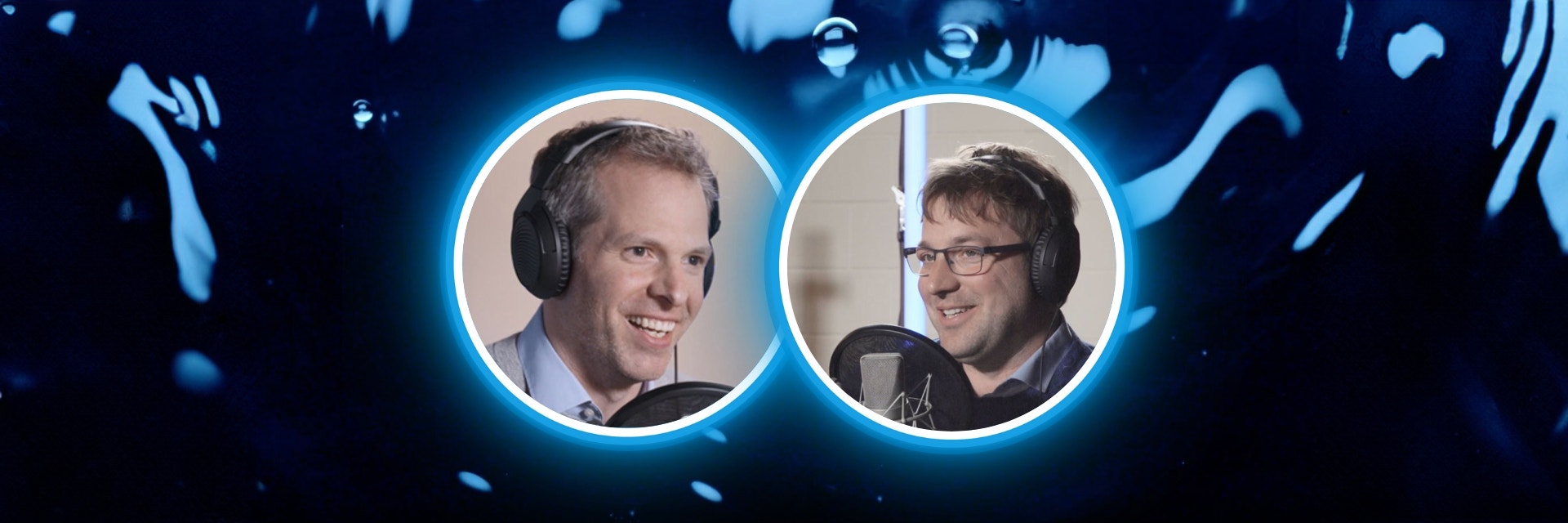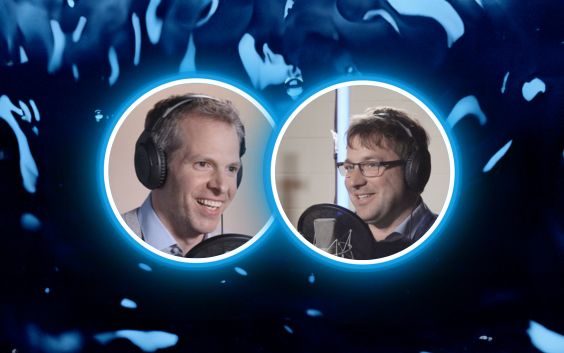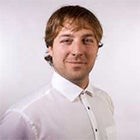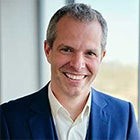PODCAST
Medical 3D Players: Looking Back on Season One (S2 Extra)
Discussing mass personalization in healthcare — because one size fits no one
- Subscribe:
- Apple Podcasts
- |
- YouTube
- |
- Spotify


We're kicking off season two of the Medical 3D Players Podcast with a special bonus episode! Join us as your hosts Pieter Slagmolen and Sebastian De Boodt reflect on the most memorable moments from the show so far, including standout episodes, key themes, and the inspiring innovations shaping the future of mass personalization in healthcare.
From groundbreaking clinical applications like face transplants to the challenges of scaling personalized solutions, this recap offers a comprehensive overview of the insights and trends that have emerged from their conversations with industry experts. Tune in for some thoughtful reflection and a glimpse of what’s to come this season!
- Subscribe:
- Apple Podcasts
- |
- YouTube
- |
- Spotify
Read the full transcript
Pieter Slagmolen 00:00
Welcome everyone to a special episode of the 3D Players podcast. Today, we're not having a guest. Essentially, it's just myself and my co-host Sebastian. We'll look back at our season one and discuss a little bit: what do we think of it? What did we learn? What did you find interesting? So, I'm really looking forward, Sebastian, to going through that with you.
Sebastian De Boodt 00:20
Me as well. And the way we're going to do this: we have a couple of questions here lying in front of us, and we're going to pull them up and then just ask each other the question.
Pieter Slagmolen 00:29
Shall I start by picking the first question? Okay — interesting one. Sebastian, what was the most memorable episode for you of season one?
Sebastian De Boodt 00:40
Well, the first thing that I think about is actually our first recording, our first episode with Alyssa Glennon, Clinical Engineer, and it was about the first face and double hand transplant, and just how the extreme use case highlights the incredible value of personalization in healthcare. So I think it was a very good one to start with.
Pieter Slagmolen 00:58
Very exciting stuff.
Sebastian De Boodt 00:59
And I think it was also just fascinating, just to think about how the innovations for such complex cases eventually also trickle down into more scalable applications, much like how going to the moon led to a lot of the everyday innovations that we're using.
Pieter Slagmolen 01:16
To every day, and even then since then, to the even more extreme, with the face transplant itself that we saw last year with the eye.
Sebastian De Boodt 01:23
With the eye transplant?
Pieter Slagmolen 01:24
Yeah, exactly. So that's the case I’m talking about. So we see that along that path. We indeed see simpler things, but we also see even more complex things, very exciting indeed. Next question.
Sebastian De Boodt 01:33
Pieter, pick a next question. Yeah, okay, it's a good one as well. Pieter, what did you think was the most memorable guest?
Pieter Slagmolen 01:44
Difficult one. I genuinely loved them all. Enjoyed every single one of the conversations. I think every one of our guests was looking to find ways to improve patient care in their capacity. They all have a strong belief in innovation and innovation as a way to improve patient care going forward. I also found them extremely engaged. They're dedicating a large part of their life to make this lasting impact, and many of them are doing it successfully. So yeah, I think we share with them a passion for personalization, and that passion is what made all of them memorable for me. So I think, yeah, difficult or mostly impossible to choose for me.
Sebastian De Boodt 02:24
I do agree. And I think something about personalization — it's rewarding. The fact that you know that you're, you know, treating an individual patient, and then if you are in a position where you can scale this to help a lot of patients — I think you're probably in the best job you can imagine.
Pieter Slagmolen 02:40
Absolutely. Okay. Next question? Let’s see. Difficult question for you. What did you find the most interesting from season one of our podcast?
Sebastian De Boodt 02:51
I don't know if I could pick out one. The stories that always stick with me are when it's about specific clinical applications because it really makes it very tangible how personalization can help and how it comes from just a concept and kind of a general idea into something where you can really relate — “okay, it’s useful.” You're bringing it back to solving a specific clinical need. Obviously, that face transplant is like a very extreme version of that. But I'm also thinking about Tom Depuydt’s episode, where we talked about applications of 3D printing in radiotherapy. I think those — I often find some of the most inspiring stories.
Pieter Slagmolen 03:28
For our loyal listeners, I think that's one thing that we'll definitely see come back in season two of our podcast series with more interesting use cases and applications.
Sebastian De Boodt 03:38
Yes, indeed. Okay, I'm going to move us on to the next question. So again, about season one, Pieter, what did you see as a key theme of the first season?
Pieter Slagmolen 03:49
The theme of the podcast, in general, is mass personalization, and the mass aspect very heavily came back, right? Scalability, the cost-effectiveness on how to do these things at scale, is what several of our guests talked about. We had Cambre Kelly or Massimo Calafiore talking about the challenges of scaling these personalized solutions, but at the same time, looking at the cost-effectiveness and sustainability of building a healthy business around these things, which I found a theme that I at least learned a lot about and also something to continue on in the future. These guests also highlight the need for innovation in manufacturing, approaches around manufacturing, and how can you balance the need and desire for more personalization with, at the same time, maintaining the product lines around those economically sustainable and viable? Yeah, that was something we talked about a lot and a very interesting theme of season one.
Sebastian De Boodt 04:42
There are quite some companies who manage quite successfully to put this into practice. I think that's very good progress to see that.
Pieter Slagmolen 04:49
Yeah, let's go for another question. What was new for you? What did you learn that you basically didn't know before going into the first season?
Sebastian De Boodt 04:57
Well, I could claim I knew already everything, but that’s definitely not true. No, there's something new in every episode. And then there are some episodes that are a bit closer to home, like we had, Andy Christensen, for example, giving a really interesting talk about also point-of-care 3D printing and how this is helping personalization to scale. But then there's others. And maybe the one I'm thinking of is Thierry Marchal from Ansys, taking the angle from the simulation side, going a bit more advanced, and that's probably a bit less familiar for me, but also for the listeners. And that's also interesting, I think, to see how other technologies, beyond just 3D printing and image processing and so on, but also how simulation and modeling can really help predict the outcome and you do planning in a certain way. But also, we're kind of learning technologies being created for aerospace and sports and so on, and applying those to the medical devices and where it's also there every day, allowing companies to bring their innovations quicker to the market. So that's one of the thought-provoking topics.
Pieter Slagmolen 05:56
Absolutely. And the parallels with other industries are, for us, sometimes new and inspiring to hear about. It's always fun, as a Belgian, to hear somebody talk about how technology that's helping Wout Van Aert [renowned Belgian cyclist referenced in the podcast with Thierry Marchal] is also going to help healthcare going forward. So I found that very interesting.
Sebastian De Boodt 06:14
All right, cool. I see we only have two questions left, so let's see what we still have here. It's like it's coincidence, but we're moving to the second season in this question: what is a big challenge that you think we should be addressing in season two of 3D Players?
Pieter Slagmolen 06:28
We did talk about economic sustainability a lot in season one. I think, season two, we do need to dive a bit deeper there, specifically on financials and financing personalized solutions. Whether that's through reimbursement pathways, where we know that a lot of people and listeners are struggling with identifying that, or other routes of getting the financials right. It's essential to build a sustainable business that you need a plan, and we see quite some variability in the plans at this point in time that different companies are having. So I would think that would be an interesting topic to talk about. What are the options? How are companies solving these options at this point in time? And what challenges are they running into? Is there anything that we as a company or as a community in general can do to make it easier for startups to get those financials right? So that would be a very interesting topic.
Sebastian De Boodt 07:20
I agree. That's not going to be easy to get to the answers, but I think it's a good challenge that we should give ourselves.
Pieter Slagmolen 07:27
Absolutely! That brings us to our final question in our bowl. Let's see, what do you think in terms of types of guests that we should have on the show going forward?
Sebastian De Boodt 07:39
That's a very good question, and based on our conversation, it's clear that we definitely want to have different companies to talk about their clinical applications, talk about some real successes across various clinical domains, and then, from there, be able to draw some conclusions about mass personalization and how it can be applied to other fields. Let's focus on that. And I think we should also try to get one of the bigger medical device companies here around the table, and because, maybe they're not always doing the most innovative stuff, but they are reaching a lot of patients and getting them on board as well, and getting their perspective on personalization and the impact it can have on their business, I think will help us all to move forward.
Pieter Slagmolen 08:18
So if you are a big medical device company, and heard Sebastian say that you are not innovative or not innovative enough, please reach out to us through medical@materialise.be, tell us that you want to come on the show, and show us that we are wrong with that opinion and that you are absolutely still leading innovation in the market.
Sebastian De Boodt 08:39
Yes, and if you're not a big medical device company, but you still would like us to talk about specific topics on personalization, or if you have a different idea of a guest that you think has something very meaningful to say and wants to share this within this community, also just let us know. We would like to get a bit more interactive in season two. So we hope to capture some responses from you as well.
Pieter Slagmolen 09:00
Absolutely. And in the meantime, like and subscribe to our content [Apple Podcasts, Google Podcasts, Spotify], and then we'll keep you updated once new episodes are coming alive.
About your hosts

Pieter Slagmolen
Innovation Manager, Materialise

Sebastian De Boodt
Market Director, Materialise
Share on:
L-104276-01